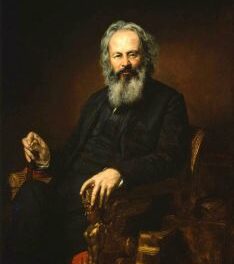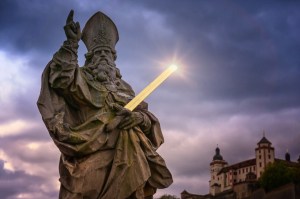We support our Publishers and Content Creators. You can view this story on their website by CLICKING HERE.
The most effective way to show that God exists is to expose our false deep-seated illusion that the world around us, our networks, are all there is and ever was, in the eternity of the world. It is our prejudices, our pride, our fear that keep us from seeing that the Prime Mover is not our private possession, but our Lord.
I have escaped the City, as I do every year in Summer. I know that this sounds trite, and perhaps even a tad snobbish, like a line from The Great Gatsby. But that heat that Daisy complained about in the 1920s is still oppressive in 2020, and there is more than one kind of heat to escape this year.
It is dusk. The cicadas are starting to hush. I am looking out at an exquisite garden split by what was once a carriage house. The front part is an orderly Italian garden with symmetrical beds delimited by grey marble borders, trimmed hedges, carefully placed remains of Roman columns and lintels, gravel, an ancient well, hortensias, and oleanders. The back part is a stately English garden. Its towering cypresses, majestic oaks, regal horse-chestnuts crown the greying landscape.
A halfmoon hangs between the cypresses swaying in the breeze. I can hear the leaves of the maples rustle. A lone hackberry looms on the right. I cannot but think of Psalm XXIII on this calm evening:
Domini est terra, et plenitudo ejus; orbis terrarum, et universi qui habitant in eo.—”The earth is the Lord’s and the fulness thereof: the world, and all they that dwell therein.”
There is something wondrous about the ushering in of night, when we can put the concerns of the day to rest—the calls, the busy work, the noise—and look upon what is not our own handiwork: the trees that will stretch towards the light with or without us, the moon that has shone since long before mankind was young, the lone star that has appeared in the sky above the trees. It is at night that we can cease measuring the world through our own interests, fears, and ambitions. Cicadas will rest when the sky darkens, no matter what we might think or want. It is at night that we can look with awe at creation. This, I muse as I look out on the gardens, must be why the Psalmist also said that Nox nocti indicat scientiam—night to night sheweth knowledge. Not even the obstinately impervious Kant was indifferent to the wonder of the night sky.
There was a time, or so history tells us, when men could see during the day what we seem now only to glimpse in the calm of those nights when we are far away from the agitators and their destructiveness, the sophists and their angry drivel, from the creaking institutions of our world: Domini est terra, et plenitudo ejus: orbis terrarum, et universi qui habitant in eo. It was the time of the cathedrals, that are now being set on fire in France.
There were scoundrels when the great cathedrals were being built: murderous kings, envious courtiers, thieving merchants, armed robbers, simoniac priests, idolatrous priests, heretics, adulterers, turn-coats, suicides, and even children-eaters. Dante’s Inferno is rife with them. Their existence and sins did not blind the people who watched the cathedrals being built, payed for them, and prayed in them, to the grounding truth that Domini est terra, et plenitudo ejus. It did not temper their timor et tremor, their fear and trembling, sunder their communal reverence of God. The cathedrals stand, witness to their capacity to see.
There was death when the stonemasons were at work in Chartres and Bourges, Amiens and Rheims, Saint Denis and Beauvais, and pain. Mothers mourned their children, and fathers too, and more often than we do. Animals devoured crops. Hail destroyed roofs. Danger and disease were a fact of life—and death. But they too did not blind the people to the fact that Domini est terra, et plenitudo ejus. The cathedrals, the monasteries (those that have survived), the pilgrimage routes, the illuminated manuscripts, all still give testimony to their crafters’ calm capacity to perceive God at work in all things, and to give thanks.
What has made our times so blind? I ask myself as I look out at the moon hanging between the cypresses surrounded by a symphony of trees, the careful work of the garden designers of centuries ago. How have we become frightened, lonely believers when the whole universe cries out in its praise of God? How have we allowed the world to relegate belief to the paltriness of a possible mental state, when we are surrounded by God’s handiwork? Do we not see that that Primum Movens, that Pearl that we secretly clutch, our quiet in the storm, is the Lord of everything and everyone? That He is not a private possession, but the fulness of the entire world, of each and all they that dwell within? That He is not ours, but we His? That He does not just keep me, me alone, in existence, but keeps everything in being so that it is each thing in its individuality and everything in its totality that shouts out the glory of God?
There is a passage in the Summa Contra Gentiles’s long proof of the existence of God that has been gnawing at me for weeks. In it, Aquinas argues that nihil movebitur in mundo—nothing will be put into motion in the world—if the universe does not have one sole Primum Movens.
His arguments do not build on that radical dependence of divisible things upon a Prime Mover that he had elucidated in his beautiful “spherical” proof. Aquinas could neatly have demonstrated that that God alone is the Creator, the Lord, the Fulness of the world and all they that dwell within, had he simply drawn the consequences of that proof. If no divisible thing is sufficient unto itself for its existence and subsistence, but must radically depend upon a Prime Mover to be and to act, the universe itself cannot but radically depend upon a Prime Mover to be and act. Everything in the universe, including the universe itself, is divisible. The facts, then, that there is only one universe, or that everything that is must share in being, could have furnished Aquinas with the additional premise that he needed to show that there can be only one Prime Mover.
Aquinas does variously call upon these additional premises, but not in the paragraphs following the “spherical” proof. There he turns to one of the principles that Aristotle uses in the Physics to demonstrate the existence of God: in moventibus et motis non sit procedere in infinitum—one cannot proceed to infinity in movers and things put into motion.
Why? Why wrestle with the infinite to prove that there is only one Prime Mover, when radical dependence, the singularity of the universe, and the commonality of being are so much easier to use as premises?
The answer, I think as I stand here looking at the hushed gardens, lies precisely in what Aquinas does not want early on in the Summa Contra Gentiles to invoke: those real commonalities in which beings must share in order to be and be what they are—being itself first among them, and natures. He does not want to call upon the wondrous symphony of life that is so magnificently on display on this calm night: the trees, whose roots intertwine, the insects that call out to each other, the heavenly bodies that furnish them with their nourishment, the hungry human being who gazes at them in wonder. Aquinas wants to demonstrate that the Primum Movens is the Lord of the universe starting from bare perceptible things that are put into motion and that put other things into motion: discrete physical moved movers. He wants to prove that God alone is Lord starting from the lone tree, the sole cicada, the moon, and not the garden.
I also think that I know why he lowers his gaze to discrete physical moved movers and treats them as givens, or at least why it is important for us now to follow his lead down that rabbit hole. Real commonalities—shared ways of being, shared aims, real interdependence—are precisely what materialist and emotionalist crowds eschew, and troubled times are made by and make for materialists and emotionalists, as the rise of Philip II of Macedonia and the startling success of the Epicureans and Stoics in Athens that ensued it demonstrate.
It is not by chance that we today feel like frightened, lonely believers. Like the Athenians who saw their proud independence vanquished, we live in wild times, when those codifications of our commonalities that we believed were constants—churches, governments, schools, our customs, our culture—are being assailed by people, who like Philip II never believed in or shared them, driven as they are by what they consider the real basics: themselves, their own comfort (or discomfort), their right to order the world to their own liking.
Like those Athenians who flocked to Epicurus while Aristotle was still alive, we who witness the battering and betrayal of our institutions, the disruption of the rhythm and order of our lives, we too are tempted to forsake the institutions, to abandon the very thought of commonalities, and to focus on what we too tacitly believe are the real basics: ourselves, our survival, our discomfort, our need to control our fates. We too are tempted to look at wondrous gardens not as a symphony of life, but as mere manmade collections of discrete things to order as we please.
It is precisely this temptation that makes focusing with Aquinas on bare individual moved movers crucial. It unveils those hidden presuppositions through which we really measure reality, and that keep us today from seeing that Domini est terra et plenitudo ejus.
Let us assume with Aquinas in chapter 13 of the Contra Gentiles, that there are no shareable ontological truths, no universal natures, no natural laws, no objective principles, but only discrete perceptible things—the horse-chestnut, the cypress, the hackberry, the moon, the star, me, you—that each are “put into motion” by other perceptible things, that like them are “put into motion” by other perceptible things.
The universe, in this scenario, would be nothing but a closed system: a self-contained web of “motions” that each mover effects in each mover with which it is in direct contact. It would, in other words, be something like what academics believe a university to be: a closed reality constituted by nothing but those “actions” and “thoughts” that they “put in motion” in their students and colleagues, and which were “put in motion” in them by their own professors and colleagues, whom other professors, who had themselves been previously “put in motion” by their own professors, had “put in motion,” and so on and so forth.
Like universities in the minds of academics, banks in the minds of bankers, governments in the minds of those who govern, the universe—reality itself—would, in this scenario, have to be self-caused: a network, a web that is completely constituted by the moved movers that inhabit it.
It would have also to be eternal. Had there been a time when there were no moved movers to constitute that self-caused network, that universe, moved movers would have had to come to exist, and whatever comes to exist must have some cause, that could not clearly belong to the universe of moved movers, since it did not yet exist. But this is precisely what we rejected when we reduced the world to bare perceptibles: discrete things that move and are put into motion.
We all think of the universe this way, to some degree or another. We assume that the world is a network of networks, each of which is constituted solely by the relations between those things that are in direct contact with one another: people, animals, nature, the earth, planets, the stars, what have you. We call these networks ‘systems,’ or ‘institutions,’ ‘schools,’ ‘governments,’ and other similar names, in the human case.
We assume that the nature of the game is to get to know the networks and work within them: that what we must do to be successful is to become a part of the networks of power, to “move” those who are in those privileged networks—impress them, befriend them—and through them get to know those who belong to the more powerful network, whose members we must again move in order to join, and so forth.
We assume that the networks are permanent: the church, my parish, my bank, my university, New York, my nation. We fall asleep in the conviction that the world in which we wake will not have been altered, that we ourselves individually can change, can move, but the underlying networks will not. My home in New York, I am convinced as I look out on the gardens miles and miles from the heat of the City on this calm, beautiful evening, is waiting for me, along with my neighbors, my doormen, my parish, my university, the delis and restaurants, the trains and cabs, the bustle.
This is why the Job-like whirlwinds whipping around us tempt us to turn inwards and abandon our institutions and commonalities: They challenge that trust that we all implicitly have in both the identity of the networks and reality itself, and permanence of the networks themselves. The Job-like whirlwinds threaten our universe.
But the universe, if by that we mean that self-contained network of networks that is completely constituted by the individual moved movers that live within it, cannot possibly be permanent. How could a network constituted by discrete impermanent things be permanent? That network would have necessarily to change simultaneously with the motion of each individual moved mover that constitutes it: quod movet motum, simul dum movet movetur—whatever moves by being put in motion, is put in motion at the same time as it moves. The network would have to be in constant flux.
But this too is impossible, as Aquinas shows. Were the universe that network of networks that we presume it to be, it could not move at all. That network would have to be something like a movable unit: quasi unum mobile. It would have to be boundless—an unum infinitum, an infinite unit—since it would both necessarily lack an overarching order (constituted as it would be by a multiplicity of moved movers with their own private aims) and be eternal.
Were that unum mobile infinitum—single boundless changing unit—in that constant flux caused the moved movers that constitute it, it would have to move in finite time—movetur in tempore finite—quod est impossibile—which is impossible. What is boundless cannot move in bounded space or measured time.
So the universe cannot be that closed system, that permanent web of motions constituted by discrete moved movers, as much as it is endemic to us to assume that it is. Its constants cannot be the institutions we form—governments, schools, cities, and even parishes—as painful as it is for us to admit.
As I look out at the exquisite garden, I see the lintels and remains of columns, strategically placed between the hortensias and oleanders. The Empire that produced them, I know, is gone. But not the stone of which they are made, not the human eyes that gaze upon them, and appreciate their harmony. What is permanent, what is constant, I realize looking out at the exquisite garden before me, is not our structures, but that which holds us all in being.
At once, I finally understand that cryptic line of Aquinas’s in Chapter 13, why he insisted on turning to the infinite, and why it is so hard for us today to see that Domini est terra, et plenitudo ejus:
via efficacissima ad probandum Deus esse est ex suppositione aeternitatis mundi, qua posita, minus videtur esse manifestum quod Deus sit—”the most efficient way to prove that God exists starts from the presupposition of the eternity of the world, which if it is posited, makes it less manifest that God is.”
The most effective way to show that God exists is to expose our false deep-seated illusion qua posita, minus videtur esse manifestum quod Deus sit—which if it is posited makes it less manifest that God is: our belief that the world around us, our networks, are all there is and ever was, in the aeternitatis mundi—the eternity of the world. How can we see that Domini est terra if we hold fast to our institutions, to our belief that power belongs to the networks? It is our prejudices, our pride, our fear that keep us from seeing that the Primum Movens is not our private possession, but our Lord: that He is not just our fulness, but the fulness of the entire world, of all they that dwell within.
This is why in response to the question Quis ascendit in montem Domini? Aut quis stabit in loco sanctus ejus?—who shall ascend the mountain of the Lord? And who shall stand in his holy place?—the Psalmist answered:
Innocens manibus et mundo corde, qui non accepit in vano animam suam—”the innocent in hands and the clean of heart, who hath not received his soul in vain.”
This essay was first published here in September 2020.
The Imaginative Conservative applies the principle of appreciation to the discussion of culture and politics—we approach dialogue with magnanimity rather than with mere civility. Will you help us remain a refreshing oasis in the increasingly contentious arena of modern discourse? Please consider donating now.
The featured image is courtesy of Pixabay and has been brightened slightly for clarity.

 Conservative
Conservative  Search
Search Trending
Trending Current News
Current News 






